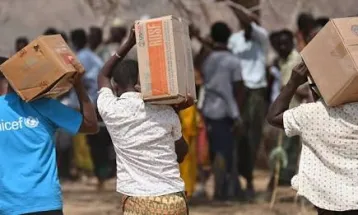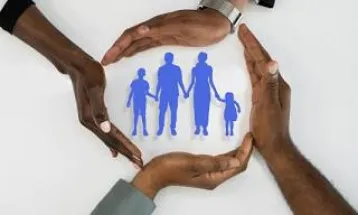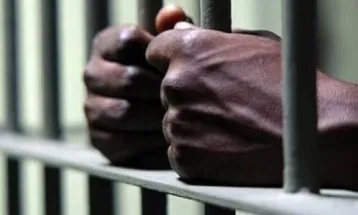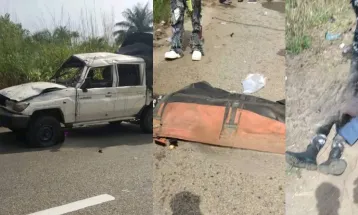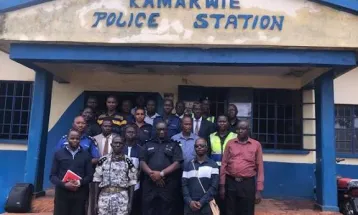Commit and Act Foundation Opens Freetown Headquarters to Expand Fight Against Gender-Based Violence

By Abu Bakarr Tarawally | FREETOWN, Sierra Leone
The Commit and Act Foundation–Sierra Leone (CAF–SL) has officially opened its new headquarters in Freetown, marking a pivotal step in the organisation’s mission to tackle gender-based violence, promote reproductive health rights, and empower survivors across the country.
The opening ceremony drew a broad array of government officials, community leaders, and international development partners on Friday in the Aberdeen community in the west of the capital.
Charles Vandi, the Deputy Chief Director at the Ministry of Gender and Children’s Affairs, served as chairman of the event. He praised the foundation’s expanding footprint, calling the opening “an important moment” for advocacy on issues such as female genital mutilation (FGM), sexual reproductive health rights, and community-based gender justice.
“The presence of CAF–SL in Freetown will strengthen advocacy, coordination, and response efforts with both government and civil society actors,” Vandi said.
CAF–SL was founded in 2010 through a partnership between local professionals and Commit and Act Germany, an organisation specialising in psychological support for post-conflict and disaster-affected communities. Since its inception, the foundation has blended Acceptance and Commitment Therapy (ACT) with grassroots activism to help survivors of sexual and gender-based violence rebuild their lives.
Speaking at the event, co-founder Hannah K. Vonjoh said that although CAF–SL’s main office is in Bo, the organisation’s presence in the capital is a strategic move to facilitate direct engagement with ministries, international partners, and key stakeholders.
“We realised that to scale our impact, we need a hub in Freetown. This new office will help us coordinate better and strengthen national advocacy,” Vonjoh said.
Representing local authorities, Chief Abu Bakarr Swarray of the Crab Town community expressed optimism about the foundation’s arrival.
“Too often, victims of sexual abuse and domestic violence in this area don’t know where to turn,” Chief Swarray said. “CAF–SL gives us hope and a structure for justice.”
CAF–SL’s expansion has been fuelled by international support, notably from German Doctors for Developing Countries and Commit and Act Germany. Mr. Kallon, a representative from the German Doctors, welcomed the Freetown office and emphasised the foundation's community-level results.
“CAF–SL is not a portfolio NGO. The impact is visible at the grassroots. The reporting and sharing of these successes requires improvement, he noted.
The foundation’s work spans several districts—Bo, Bombali, Tonkolili, and now the Western Area—and encompasses various projects. Key interventions include:
- Girls’ Shelter Project (2015–2025): Supported 3,245 survivors of abuse in Bo and Makeni.
- Hope Baby Shelter (2017–2025): Provided care for 747 babies and 734 teen mothers with psychosocial support, parenting training, and livelihood empowerment.
- My Body, My Right: Targets FGM reduction and school retention for 800 girls in 69 communities.
- From Ears to Hearts Radio Program: Broadcasts gender-based violence awareness campaigns in Bo and Bombali.
- Youth Leadership Program: Empowers youth aged 10–17 to lead change in their communities.
- DARE to Connect: Offers couples training in conflict resolution to foster peaceful homes.
- Agricultural Empowerment: Provides farming opportunities for former FGM practitioners and survivors across 905 acres in four districts.
CAF–SL also operates safe homes in Bo and Makeni, offering medical care, legal aid, education, and shelter to girls recovering from trauma related to abuse, FGM, or domestic violence.
Despite challenges in visibility and underreporting of their work, CAF–SL’s impact is growing, and now with its base in Freetown, the foundation is poised to influence national policy and strengthen its partnerships.
“Our goal is not just to support survivors but to transform systems,” Vonjoh said. “This new office brings us closer to making that a reality.”
Given the high number of SGBV cases in the capital, several stakeholders clarified the need for CAF-SL to establish a shelter in Freetown. Despite the organization's stated willingness to expand its shelter program, a lack of funding currently constrains this move. As a result, there were strong appeals for donor support and institutional collaboration to help CAF-SL establish and sustain a fully capacitated shelter facility in the Western Area to provide lifesaving support for survivors.
The event also highlighted some of the major systemic constraints in handling SGBV cases. A representative from the Family Support Unit (FSU) of the Sierra Leone Police outlined key challenges, including the frequent withdrawal or noncompliance of complainants, often due to out-of-court settlements or community pressure to compromise. Additionally, the unit faces limited logistical and human resource capacity, making it difficult to expedite investigations and ensure timely justice. These gaps, the officer noted, make collaboration with organisations like CAF-SL crucial to building survivors' trust and increasing case follow-through.
Adding a critical dimension to the day’s proceedings was lawyer Elvis Kargbo, head of Betts and Berewa Chambers, which serves as the foundation’s legal retainer. Kargbo clarified that while they do not prosecute cases directly, they work closely with state prosecutors to fast-track justice for survivors of sexual and gender-based violence (SGBV). He noted that their legal approach is grounded in both Sierra Leonean law and international treaties on gender rights.
Significantly, Kargbo stressed a faith-based lens in their legal work, acknowledging the cultural and religious complexities surrounding SGBV cases. “We interpret the law in ways that resonate with both human dignity and divine justice,” he said. “This allows us to connect with survivors and communities on moral grounds, not just legal terms.” This culturally respectful legal strategy, he added, has helped foster trust and break longstanding silences around abuse.


